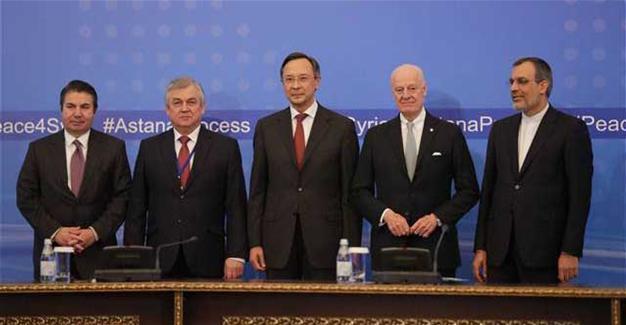Turkey says four thresholds surpassed in Astana talks on Syria
Serkan Demirtaş - ANKARA

Two days of talks in Astana that brought Syria’s government and opposition groups around the same table helped in surpassing four key thresholds in efforts to resolve the five years of unrest in the war-torn country, according to Turkish officials, which believe the upcoming Geneva negotiations will be based on a more solid ground.
“We deem the talks in Astana a success. The Astana talks constituted an important stage on Syria. We were able to pass four key thresholds in Astana which will make the upcoming Geneva talks on Feb. 8 more efficient,” a high-level Turkish official told the Hürriyet Daily News on Jan. 25.
Representatives of the Syrian government and opposition groups came together in Kazakhstan’s capital of Astana on Jan. 23 and 24 with the participation of Turkish, Russian and Iranian diplomats, as well as the United Nations’ special representative for Syria, Staffan de Mistura.
A joint communiqué released in the aftermath of talks underlined the need for the continuation of the nationwide cease-fire in Syria and noted that talks would be held once more under the auspices of the United Nations in Geneva on Feb. 8.
The four key thresholds that were surpassed in Astana, according to Turkey, are as follows:
U.N. process: The Astana talks made it clear that efforts to find a peaceful and political solution to the Syrian question must undisputedly occur under the U.N. regardless of where the meetings are held.
Regime and opposition meet: It was the first time in the six-year unrest that representatives of the Syrian government and armed opposition groups sat around the same table, albeit in a ceremonial fashion. Both sides’ agreement to listen to each other in the first session of the meeting was noteworthy.
Opposition unified: For Ankara, the ability of the oppositional groups to stand in unity and solidarity in Astana was also very important. “The opposition with its armed and unarmed groups, with those who have been physically in Astana and those who have been not, with those who are based in Doha or those in Istanbul, acted in unity. That does not mean that all groups have been satisfied but they have shown solidarity and a sort of unity,” the official said. The opposition groups were as inclusive as possible and included Syrian Kurdish and Turkmen groups as well.
Iran takes responsibility: Astana made it clear that Iran was taking responsibility and is committed to the continuation of the cease-fire in Syria by using its influence on Shiite militias and Hezbollah.
Situation still fragile Although the situation in Syria is still fragile and is open to provocations, the Turkish official said, “Thanks to the commitment of the Turkish and Russian leaders and Iran’s inclusion in this process, we are hopeful of further proceeding for peace in Syria.”
The cease-fire in Syria will be monitored by Turkey, Russia and Iran as the three countries will establish a mechanism in the coming days. “Representatives from the military, intelligence and diplomatic services will come together in the coming days to establish this mechanism,” the official said.
All three countries will monitor the implementation of the cease-fire through their own means and will record violations while informing the other two countries immediately through designated contact persons in a communication system that will function 24 hours a day. The mechanism is slated to be functional before the Geneva talks on Feb. 8.
US not destructive For Turkey, the United States’ decision to attend Astana talks at the ambassadorial level and as a mere monitor was not a big problem.
“Jan. 23 was the first working day of Donald Trump as the U.S. president. So it’s understandable that he did not send anybody,” the official said. “But,” the official added, “The U.S. has not moved in a destructive way. They have not done or said anything to block the Astana talks.”
No constitution draft given to opposition One important clarification the Turkish official made was on claims that Russia introduced a constitutional draft to the Syrian oppositional groups in Astana. “I can certainly tell you that no constitution draft was given to Syrian opposition groups. There were some ideas whether the future of Syria could be discussed in Astana, but this has never happened,” the official stated.
The official also recalled that the U.N. Security Council Resolution 2254 that shapes the road map for a political transition in Syria outlines a sequence at what stage the interim government will be formed as well as a joint commission to draft the new constitution. “Therefore, we are not there yet,” the official added.
Yıldırım: Astana was a success Prime Minister Binali Yıldırım described the Astana meetings on Syria as a “diplomatic success,” expressing his hope that the process would continue in Geneva through talks for a political solution. “There has been diplomatic success there. The U.N. has gotten involved and a serious diplomatic effort has now been kicked off,” he said.
 Two days of talks in Astana that brought Syria’s government and opposition groups around the same table helped in surpassing four key thresholds in efforts to resolve the five years of unrest in the war-torn country, according to Turkish officials, which believe the upcoming Geneva negotiations will be based on a more solid ground.
Two days of talks in Astana that brought Syria’s government and opposition groups around the same table helped in surpassing four key thresholds in efforts to resolve the five years of unrest in the war-torn country, according to Turkish officials, which believe the upcoming Geneva negotiations will be based on a more solid ground.